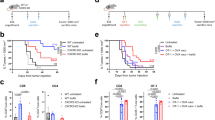Abstract
A new, generally applicable procedure is described for the introduction of defined costimulatory molecules into human cancer cells to increase their T-cell stimulatory capacity. The procedure involves infection with Newcastle disease virus to mediate the cell surface binding of costimulatory molecules (e.g., specially designed bispecific antibodies (bsAb)). The modification is independent of tumor cell proliferation and laborious recombinant gene technology and can be applied directly to freshly isolated and γ-irradiated patient-derived tumor cells as an autologous cancer vaccine. Following the infection of tumor cells with a nonvirulent strain of Newcastle disease virus, the cells are washed and then further modified by coincubation with bsAbs, which attach with one arm to the viral hemagglutinin-neuraminidase (HN) molecule on the infected tumor cells. The second specificity of one bsAb (bs HN × CD28) is directed against CD28 to augment antitumor T-cell responses by selectively channeling positive costimulatory signals via the CD28 pathway. A second bsAb (bs HN × CD3) was produced to deliver T-cell receptor-mediated signals either alone (bsCD3 vaccine) or in combination with anti-CD28 (bsCD3 vaccine plus bsCD28 vaccine). In human T-cell stimulation studies in vitro, the bsCD28 vaccine caused an up-regulation of early (CD69) and late (CD25) T-cell activation markers on CD4 and CD8 T lymphocytes from either normal healthy donors or cancer patients (autologous system) and induced tumor cytostasis in nonmodified bystander tumor cells. In addition, in combination with the bsCD3 vaccine, augmented antitumor cytotoxicity and T-cell proliferative responses were observed. This tumor vaccine modification procedure is highly specific, quick, economic, and has a broad range of clinical applications.
This is a preview of subscription content, access via your institution
Access options
Subscribe to this journal
Receive 12 print issues and online access
$259.00 per year
only $21.58 per issue
Buy this article
- Purchase on Springer Link
- Instant access to full article PDF
Prices may be subject to local taxes which are calculated during checkout
Similar content being viewed by others
Author information
Authors and Affiliations
Corresponding author
Rights and permissions
About this article
Cite this article
Haas, C., Herold-Mende, C., Gerhards, R. et al. An effective strategy of human tumor vaccine modification by coupling bispecific costimulatory molecules. Cancer Gene Ther 6, 254–262 (1999). https://doi.org/10.1038/sj.cgt.7700048
Received:
Accepted:
Published:
Issue Date:
DOI: https://doi.org/10.1038/sj.cgt.7700048
Keywords
This article is cited by
-
Recombinant lipid-tagged antibody fragments as functional cell-surface receptors
Nature Medicine (2000)



